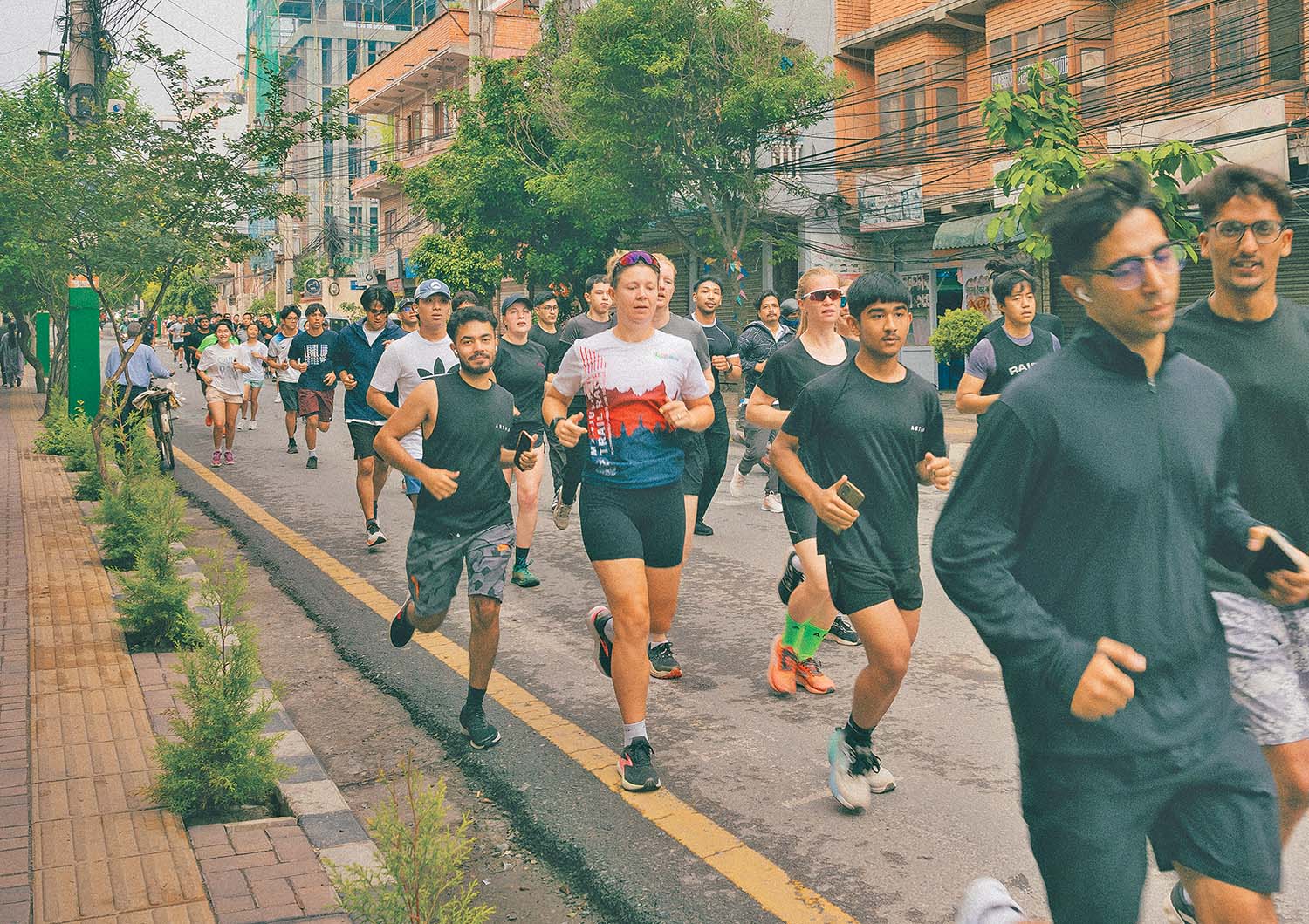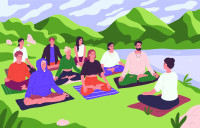Culture & Lifestyle
Pacing a movement: How Artha Run Club is redefining the running culture
Long before the city’s chaos kicks in, Artha’s runners reclaim public space—moving not for speed, but for purpose.
Samundra Gurung
One Saturday morning, while the city still slept under a blanket of smog and silence, my friend Swastika dragged me out of bed to join her run club that she went to every week with the promise of post-run pastries and good company. I was sceptical. To me, running was a solo pilgrimage—a breathless, existential argument between my lungs and my will to live. And group runs? I only ever saw them in movies with boot camps and barking sergeants. I figured there was no space in that scene for someone like me. But that morning, something shifted. Maybe it was the cool air. Maybe it was trying something new and coming out of my comfort zone. Or then just maybe—it was the pastries.
By 6:30 am, I had officially become ‘That Person’—standing outside the International Club in Sanepa, wondering if coffee counted as pre-run hydration. The street was quiet except for the rhythmic arrival of runners—some clipped and chipper, others clearly powered by sheer habit and muscle memory. There were hydration vests that looked like tactical gear, minimalist sneakers that whispered ‘marathon PR’, much to my comfort—people like me whose hoodie was half-zipped as if sleep was still negotiating with consciousness.
But no one looked scary. No one looked like they’d yell “Drop and give me twenty!” if you stretched the wrong way or slowed down. Instead, there were warm nods, beaming smiles, and that quiet pre-run energy where people appreciated the calm—no pressure to chat, no awkward icebreakers. It didn’t feel elite. It felt…oddly human. And kind of beautiful. Like a community disguised as a crowd.
That was my first experience with Artha Run Club, a grassroots running community that has become a symbol of personal growth, urban wellness, and social connection in Nepal’s fast-evolving fitness culture. What started as a casual initiative among three friends—Prakritartha Ghimire, Yash Shah, and Avash Shrestha—has grown into a movement.
And the key ingredient? Not competition, but community.
“We didn’t set out to build a big movement,” says Ghimire, one of Artha’s co-founders. “It started as a way to hold ourselves accountable—to show up, to move. And somehow, that simple intention created space for others to feel seen and supported too.”
The word Artha—which means purpose in Sanskrit—isn’t just a name. It’s the philosophical backbone of the club. Every run, every route, every cheer is anchored in this idea: that movement is meaningful, and that each step—no matter how slow or unglamorous—is still progress.
But interestingly, Artha almost wasn’t called Artha at all. In the early stages, the founders floated a different name: Evera, meaning “the gift of God.” It had a certain charm, but a quick search revealed that the name was already flooded with other brands. So they circled back. They reflected on what anchored their mission and what word carried weight without fanfare. And Artha—simple, direct, honest—fits the theme.
The first official run was held on May 31, 2024, from the grounds of Hotel Annapurna. Just a handful of friends and family showed up that morning, jogging into something new. And yet, exactly a year later, over 350 people gathered to mark Artha’s anniversary—many of them strangers turned community.
Each Saturday, Artha hosts open community runs, divided by pace groups to include everyone from beginners to distance runners. There are no finish line medals, no timing chips—just camaraderie, encouragement, and smiles.
“We make it clear,” says Shrestha, another co-founder, “that it doesn’t matter how fast you are. It matters that you showed up.”

Inclusivity is core to Artha’s structure. This inclusivity extends beyond speed and ability to embrace different motivations, whether fitness, social connection, or mental well-being. Experienced volunteers known as “sweepers” stay with the last group, ensuring no one is left behind. That structure has become a safety net for newcomers who might otherwise feel intimidated or self-conscious. The presence of multiple pace groups and sweepers guarantees that everyone can participate comfortably.
“There were days I couldn’t even run 500 meters without stopping,” recalls Shah, who co-founded the club just two years after he began running himself. “Now I’m helping others push through that same fear. That’s the cycle—someone helps you, and you help the next person.”
However running through the streets of Kathmandu isn’t like gliding through Central Park or jogging along the Seine. It’s gritty, unpredictable, and often dangerous. Potholes, smog, stray dogs, and chaotic traffic pose real challenges. But that hasn’t stopped Artha.
“We’ve had to adapt,” says Ghimire. “We choose safer routes, we run early, and we emphasise awareness. But in a way, it makes the runs more powerful. You’re reclaiming the space.”
More than physical transformation, it’s the mental and cultural shift that stands out. The simple act of running with others has created a ripple effect of confidence, discipline, and emotional growth.
In Nepal, running wasn’t always a social activity. It was either a high-performance sport or an isolated effort. But that’s changing.
“Young people used to associate weekends with late nights and hangovers,” says Shah. “Now it’s 6 am runs, black coffee, and stretching in the sun.”
This change isn’t isolated. Artha’s growth mirrors a larger transformation across Nepal’s urban youth—toward health-consciousness, community, and intentional living. Social media has helped too. Artha’s Instagram page, which began as a few candid snapshots, now showcases vibrant documentation of hundreds of lives intersecting on Lalitpur’s streets. Their Instagram is buzzing with testimonials, personal anecdotes and route maps.
“You’ll see people from all walks of life, who’ve never run a kilometre in their life—running together, which is inspiring,” says Shrestha.
Each week, new faces appear—some shy, some unsure, all welcomed. Despite its growth, Artha remains free and community-driven. The founders have resisted commercialisation, though they’ve welcomed support from local wellness brands like SnackOn and Beyond Trend, who offer energy bars, hydration kits, and post-run perks. Upcoming ideas include night runs, monthly challenges, and anniversary events with a festive, open invitation.
“We don’t want to just be a running club,” says Ghimire. “We want to be a lifestyle—something that helps people show up for themselves every week.”
That vision is catching on. The interest continues to grow from those who hear about the club through word of mouth or stumble upon a group of Artha runners mid-run. While the social and emotional elements are powerful, the physical benefits of running shouldn’t be underestimated. It boosts cardiovascular health, builds endurance, and supports overall physical well-being. Studies have shown that regular running lowers the risk of heart disease, reduces blood pressure, and strengthens the immune system.
Mentally, running stimulates the release of endorphins and serotonin, chemicals that improve mood and reduce symptoms of anxiety and depression. For some, it even helps regulate sleep patterns and increases focus. And the weight-bearing nature of the activity strengthens bones and joints, making it especially effective for long-term musculoskeletal health.
Still, the main motto of the club remains unchanged. “You don’t have to be fit to join,” says Yash. “You just have to come. The rest will follow.” For many, running becomes part of who they are. It shapes routines, anchors emotions, and offers a structure in a world that often feels chaotic, whether it’s the sunrise solo runner seeking clarity, or the evening group runner chasing connection. In cities where loneliness is common, run clubs offer a rare space where strangers become teammates, without pressure, judgment, or pretence. And in doing so, they shift the image of running from competitive grind to collective joy.
Two months ago, if someone had told me I’d look forward to running at dawn every weekend, I would’ve laughed. But something about the energy of the group, the quiet determination on everyone’s faces, and the knowledge that I wasn’t alone made me stay. I don’t run fast. I still take walking breaks. But I show up.
And that, I’ve learned, is what matters most.
As the sun rises over Kathmandu and the city stretches awake, I noticed something: Artha runners return home, not drained, but full. Not just from endorphins, but from a quiet, persistent knowing: they kept a promise to themselves. And in that, they found something better than a finish line. They found purpose.




 9.68°C Kathmandu
9.68°C Kathmandu















